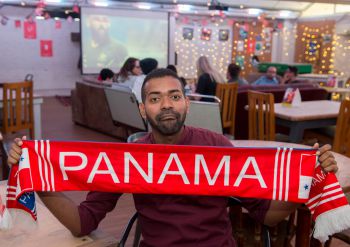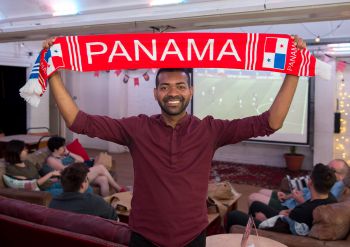Much more than hats and a canal: Lone Panamanian student urges neutrals to back his heroes at the World Cup
By: Neil Vowles
Last updated: Friday, 22 June 2018

Anibal Cardenas Mosquera is a masters student from Panama studying development studies at the Institute of Development Studies

More than 20 million fans will be urging England to beat Panama this Sunday and potentially secure qualification from the World Cup group stage.
So spare a thought for University of Sussex student Anibal Cardenas Mosquera, who might be the only Panamanian in Sussex and who is hoping that Harry Kane et al are left disappointed.
Anibal, a masters student from Panama studying development studies at the Institute of Development Studies, will be cheering his homeland on at a screening of the game at the University campus as part of our second-ever Community Festival, being held this Sunday between 11am and 3pm.
He is asking any neutrals interested in watching the game to come join him to even up the sides, with a bevy of England fans expected in the Students' Union cafe for what promises to be a real family-friendly atmosphere.
Anibal said: “Obviously the World Cup is a huge event for all football fans. But for England, it’s pretty much guaranteed you will play in one every four years.
"For Panama this is our first ever time at the World Cup and for a country of 4 million people, that in itself is a really incredible achievement. We don’t care that much about the results because we’ve already done amazing just to be here, so we just want to see the players giving their all for Panama. For us to hold Belgium to a 0-0 draw at half-time was a huge accomplishment.
“Panama is such a small country that pretty much everybody has a story about how they know someone in our World Cup squad. When I was at high school our school played a game against [Panamanian number 9] Gabriel Torres. I used to think we had quite a good team but he scored a hat-trick against us.”
The University of Sussex prides itself on the internationalism of its staff and students, with more than 140 countries represented on campus including from 31 of the 32 nationalities competing at the World Cup in Russia.
Before the screening of Sunday’s game, Anibal will be giving a short talk all about his country to help football fans learn a little more about the Central American republic he grew up in.
Anibal is currently working on his masters dissertation, not an easy feat for a football fan with the distraction of the World Cup, and hopes he might find work with an NGO in his homeland after he has completed his studies.
The 27-year-old said he was attracted to study development studies at the University of Sussex because of its world-leading reputation, and he was granted a Chevening scholarship from the UK government to study at Sussex.
Anibal said: “When people find out that I am from Panama they usually mention the Panama Canal or the Panama hat. Which is fine. But there’s a lot more to my country than just that. That’s why the World Cup can be great, because inquisitive football fans both young and old have the opportunity to learn a little bit more about countries they might not have ever thought that much about.
“The World Cup is a great opportunity for the world to come together. In Latin America, for example, we want all the other Latin American countries to win, so I cheer on Columbia and Costa Rica and my friends from Colombia and Costa Rica cheer on Panama. Countries might compete against each other fiercely for 90 minutes, but for most of the tournament it is about seeing different cultures sharing football as a common ground.”
The University of Sussex Community Festival is being held at the University of Sussex campus in Falmer on Sunday June 24 from 11am to 3pm.
To sign up for the Community Festival or for more information, visit here.
Top 5 facts about Panama
The Panama hat is from Ecuador, not Panama. It got its name after Ecuadorians started selling the headwear to US workers building the original Panama Canal in the early 20th century.
Panama has no army, having disbanded it at the end of Manuel Noriega’s dictatorship in 1990. Fortunately their northern neighbor Costa Rica also has no standing army, having abolished theirs in 1948 at the end of their civil war.
Panama only separated from Colombia in 1903, having previously been part of Gran Colombia - which also included Venezuela, Ecuador, Panama, northern Peru, western Guyana and northwest Brazil.
The Pan-American Highway travels almost the entire length of the American continent, except for around 100 miles of thick jungle in Panama known as the Darién Gap.
Scotland attempted to colonise Panama in the late 17th century but, instead of bringing riches, power and guaranteeing independence as hoped, it floundered in fever and starvation and was so damaging to the nation’s finances that Scotland surrendered sovereignty to the English in the 1707 Act of Union.
